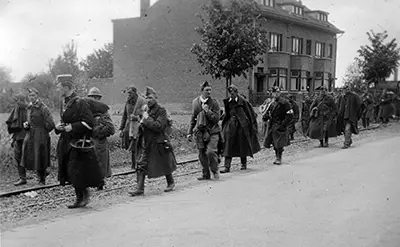Germany Invades Belgium
German Backstory
Germany was originally part of the Holy Roman Empire during the Middle Ages, and was known back then as The Kingdom of Germany. This was in 962, and is a far cry from the reunification in 1990 that combined the German Democratic Republic with the Federal Republic of Germany to make them into the superpower that they are today. The country is a founding member of the European Union, and the co-founder of Eurozone. They are a current and powerful United Nations represented country, and are home to one of the top economies in the world.


Belgium Backstory
It’s important to note that Belgium was not always what it is today, and was part of the Netherlands. The Belgian Revolution in 1830 was important not only for their independence, but for establishing their country as neutral. For centuries the area was used as a battleground for several other countries, to the point that it was nicknamed the “Battlefield of Europe”.
The Kingdom of Belgium resulted from the secession of southern provinces in the Netherlands. They were officially recognized in 1839, 9 years after they declared independence. Belgium was also a big participant in the Industrial Revolution. Much like Germany, the country is a founding member of the European Union and Eurozone.

Why Did Germany Invade Belgium?
The actual invasion took place August 4, 1914. Before the Germans declared war on France, they needed free passage across Belgium. The German government demanded this, and even sent a letter to the Belgian government for a right of free passage. This would put German troops in position for a better attack on France, giving them the best chance at securing a victory.
The problem with the request was that Belgium was a neutral country. This means they didn’t support one side over the other, leading to Germany issuing an ultimatum. If Belgium refused to cooperate, then Germany would forcefully occupy the country as an enemy.

Who Was Affected?
Belgium was affected the most, as their neutrality was used against them, forcing them into the warzone. With Germany occupying the country, it became an immediate threat to several countries. This is why Britain joined in to defend Belgium, not just for its neutrality, but for the impending danger of the Germans.
It should be noted that this also put France in a bad position, since they had to at least consider a strategy around attacking Germany before it fully invaded Belgium. Britain was a big help to several countries when it acted first, and allowed Belgium to keep its neutral leanings as granted by the treaties of 1839, confirmed by the treaties of 1870.

Names to Remember
Herr von Below Saleske was the German Foreign Secretary during 1913-1916. It was his original correspondence on August 2nd 1914 that started the events that would lead to Germany invading Belgium. His letter to the government was an ultimatum, with the penalty for refusal being a declaration of war.
M. Davignon was the Minister of Foreign Affairs, a position which he held from 1907-1916. His letter of defiance to Germany spoke about honor, and how the country would do anything to keep that-even if it was against France. Belgium was not opposed to just Germany invading, but any country. An invasion with the treaties in place was against international law, which was put in place to avoid the very situation that was happening.

Important Facts
Here are some important things to remember about the invasion and the fallout. The list contains some great facts to help you get a better idea of where everyone stood in the invasion.
- Germany and France declared war each other on the date of August 3rd, 1914
- Britain defended Belgium in order to protect international law and treaties that were in place
- Belgium was still under order of peace due to the treaties of 1839 and 1870
- France was too strongly fortified which is why the Germans detoured through Belgium
- Germany offered to pay back whatever costs were incurred if Belgium allowed free passage

Summary
Belgium was adamant about keeping the peace in its country, which was no stranger to being a battleground over the years. Germany had other ideas, but was thankfully pushed back with the help of the Britain forces.



